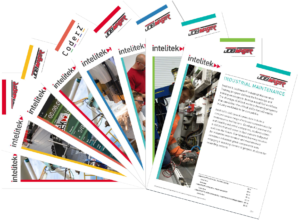New digital technology is transforming manufacturing as we know it. By integrating new technologies into the manufacturing processes, we are now able to gather and analyze data across the various components of the production line in real time – thus increasing efficiency and reducing the cost of production. This manufacturing revolution is referred to as Industry 4.0.
The new digital technologies associated with Industry 4.0 are the following:

Big Data:
The amount of data that can be collected from a production line is endless. Sensors, electricity consumption, inter-connected machines, enterprise software (ERP; MES) and customer software are just some of the sources of data that can be used to analyze efficiency. Big data will eventually enable development of AI in the manufacturing processes.
IIOT (Industrial Internet of Things):
More devices/parts in the production process will be embedded with computing capabilities. As parts are moving through assembly or logistics, they will communicate with a controller.
Vertically and Horizontally Integrated Networks:
With all the data flowing from sensors, machines, devices, as well as from other systems in the enterprise, the various networks will need to be integrated to enable optimization in decision making.
The Cloud:
Data sharing across the organization will require a robust cloud infrastructure through which access will be provided.
Cyber Security:
With critical parts of the manufacturing process relying heavily on data analysis, the ability to secure the data and to avoid cyber attacks that may lead to costly downtime – becomes a high priority.
Autonomous Robots:
Human-machine interaction is reaching new levels – with robots that can perform tasks autonomously, side by side with humans, in a safe working environment.
Simulation:
Testing and optimizing complex manufacturing processes and safety procedures – can be achieved through robust simulation tools that enable a quick and accurate modeling of the plant floor.
Augmented Reality:
Although still in their infancy, AR technologies enable an employee on the production floor to receive data and instructions on how to replace a certain part in a machine.
Additive Manufacturing:
Additive manufacturing enables a much simpler process of creating prototypes, fabricating spare parts, as well as customized batches of production.
Industry 4.0 has an immense impact on the competitiveness of manufacturing firms, as well as on the training of its workforce. Stay tuned to learn more in our upcoming blog.























